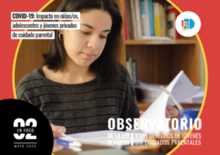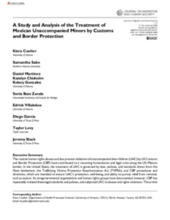This page contains documents and other resources related to children's care in the Americas. Browse resources by region, country, or category.
Displaying 351 - 360 of 1438
This study aims to describe the lived experiences of skip-generation families to better identify their needs.
This article argues that the current system of care in most jurisdictions forces foster youth to be financially and socially independent at an earlier age, despite insufficient preparation, and notes that healthcare providers can be important advocates for youth in care by championing their medical and psychological needs and serving as a bridge that lasts beyond foster care.
This study used content analysis to explore: “What are the post-care housing experiences of youth who have transitioned from care through an independent support program?”
El presente informe sistematiza la información recabada en encuentros virtuales realizados con adolescentes y jóvenes y con equipos del Sistema de promoción y protección de derechos desde el inicio del aislamiento.
El presente informe sistematiza la información recabada en encuentros virtuales realizados con adolescentes y jóvenes y con equipos del Sistema de promoción y protección de derechos desde el inicio del aislamiento. Se pudo relevar información sobre el impacto social del aislamiento en contextos institucionales, las dificultades que enfrentan en el cumplimiento de las medidas de aislamiento y de las pautas de cuidado, así como también las buenas prácticas que están teniendo lugar en el marco del cuidado de niñas, niños, adolescentes y jóvenes (NNAJ) privados de cuidado parental.
This study uses a representative sample of foster youth to investigate youth-level and county-level predictors of youths’ roles in their transitional independent living plan (TILP) development and satisfaction with the care decision meetings.
This Note proposes a model New York state statute that will recognize the importance of children's visitation with incarcerated parents, implement “child friendly” visitation programs, facilitate training for prison staff, and provide transportation for children in major cities to the prison facilities.
This study summarizes findings from caregiver usability tests, and provides a wide variety of caregiver-generated suggestions for improving foster and adoptive caregiver training curricula that are applicable to all caregiver training efforts.
This article outlines key research on how motivational interviewing is an approach that strengthens positive youth development and can improve youth’s engagement in skills, resources, and services as they age out of foster care.
This article draws from surveys of 97 recently deported Mexican unaccompanied alien children (UAC), which examine their experiences with US immigration authorities. The study finds that Mexican UAC are detained in subpar conditions, are routinely not screened for fear of return to their home countries or for human trafficking, and are not sufficiently informed about the deportation process.




